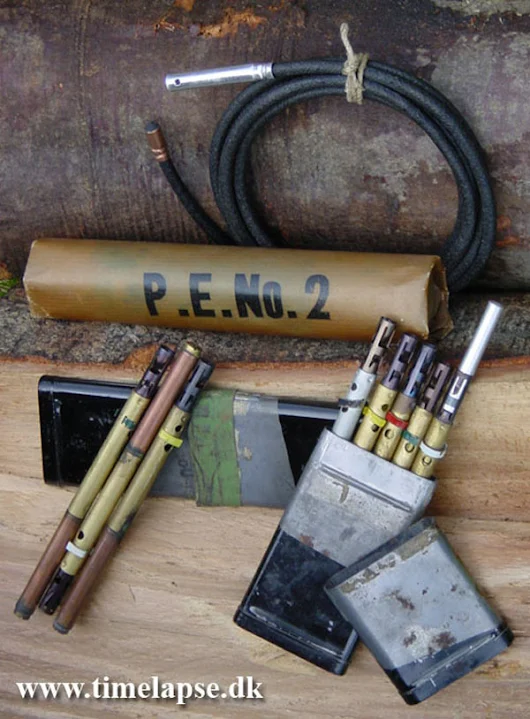"It is generally understood that the glass ampoule contains acid and that it is the thickness of the steel wire that causes the various delays available. This is however not the case the ampoule contains Copper Chloride and the steel wire has the same thickness regardless of the delay and it is the concentration of the Copper Chloride that gives the various delays.
The period of delay is indicated by the colour of the safety strip. The timings given are for 59° Fahrenheit (15°celsius).
BLACK: 10 Min.,
RED: 30 Min.,
WHITE: 2 Hrs.,
GREEN: 5½ Hrs.,
YELLOW: 12 Hrs.,
BLUE: 24 Hrs.
The delay varies according to temperature. At high temperature the delays are considerably shortened and visa versa. Each tin was packed with 5 pencils all with the same colour code. It was then sealed with a coloured strip of duct tape corresponding to the colour on the safety strips.
The pencil is composed of three different sections. The copper tube contains a clear glass ampoule filled with a green liquid being copper chloride and the brass or aluminum tube is housing the striker, coil spring and a primer. Also aluminium tubes can be found as a substitute for the common brass tube depending on who manufactured the pencils.
The “Signal Relay” or Switch No.10 commonly known as the “time-pencil” is a small and compact delayed-ignition device that could set off a detonator or a Bickford safety fuse. The “Signal Relay” was secretly invented by Cdr. A.G. Langley before the Second World War and he further developed and improved it ending up with the product that we know today as the Switch No.10. After the war Cdr. A.G. Langley was credited for the invention by the British Royal Commission on Awards."
https://en.wikipedia.org/wiki/Pencil_detonator
https://en.wikipedia.org/wiki/Fuse_(explosives)
Bombs, Detonators, Guns, Mines - tb >> .
Auxilliary unit
http://www.coleshillhouse.com/explosives-of-the-auxiliary-unit.php



No comments:
Post a Comment
Note: Only a member of this blog may post a comment.